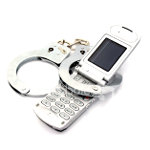The Right Call But…
 The California Supreme Court ruled on Monday, January 3, 2011 that the police do not need to obtain a warrant prior to searching a cell phone owned by someone who is currently under arrest. Such searches were ruled legal under the prevailing legal precedents surrounding Searches Incident to Arrest.
The California Supreme Court ruled on Monday, January 3, 2011 that the police do not need to obtain a warrant prior to searching a cell phone owned by someone who is currently under arrest. Such searches were ruled legal under the prevailing legal precedents surrounding Searches Incident to Arrest.
Legally this was the right call and decision.
It’s also, however, a decision that has scared and angered a number of people, for variety of knee-jerk, self-serving, and some valid reasons respectively, since the shifts in technology have lured many people into storing vast amounts of private information within their mobile devices.
We granted review in this case to decide whether the Fourth Amendment to the United States Constitution permits law enforcement officers, approximately 90 minutes after lawfully arresting a suspect and transporting him to a detention facility, to conduct a warrantless search of the text message folder of a cell phone they take from his person after the arrest. We hold that, under the United States Supreme Court’s binding precedent, such a search is valid as being incident to a lawful custodial arrest. We affirm the Court of Appeal’s judgment.
— Supreme Court of California
The People v. Gregory Diaz (S166600)
The police have the legal right, as affirmed multiple times by the SCOTUS, to search anything on the person of- or in the immediate control of anyone that they arrest without the requirement of obtaining any form of warrant to do so. Any evidence found during such searches is admissible in court and is not limited to such as is pertinent to the charges that the arrestee was originally detained for.
The previous SCOTUS opinions on: Harris v. United States (1947), United States v. Rabinowitz (1950), and Chimel v. California (1969) even extend this right of search and seizure to the room in which the suspect is arrested within – Chimel being a limiting factor since the Court held that the seizure of the entire contents of a house and its removal to FBI offices 200 miles away for examination, pursuant to an arrest under warrant of one of the persons found in the house, was unreasonable.
None of this is new; this is settled law. What is new is the amount of type of data that people carry on their persons and which is therefor subject to warrantless search in the event of their arrest.
Tags: 4th Amendment | California | Civil Liberties | Crime | Law | Police | Politics | Privacy | Technology | The Constitution | US Supreme Court

